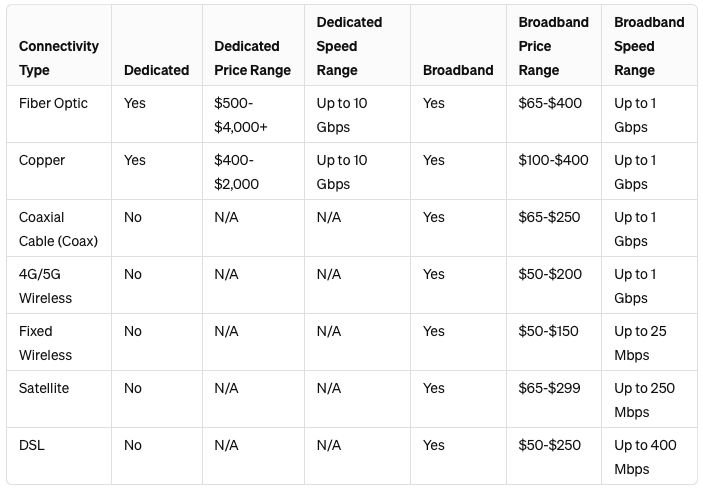
Table of Contents
Small Business Internet Service: A Comprehensive Guide
Introduction
A reliable internet connection serves as the backbone of any successful small business. Whether it’s processing online sales, engaging with customers, or enabling remote work, reliable internet connectivity is a necessity. Yet, choosing the right small business internet service can be challenging, with many options available.
This guide aims to demystify the world of internet services, providing small business owners with a clear understanding of their options. From exploring primary and backup connections to dissecting the differences between dedicated internet and broadband, this article will empower you to make informed decisions tailored to your business’s unique needs.

Understanding Your Internet Needs
Identifying the right internet service for your small business requires a thorough examination of your current operations, future growth plans, and how you use the internet daily. The right choice can boost your productivity, improve customer satisfaction, and even save you money in the long run.
Here are some detailed considerations and a checklist to help you assess your business’s internet needs more effectively. If you need more assistance picking the right small business internet service, contact Brightlio.
Consider Your Business Activities
First, take stock of all the ways your business uses the internet. This includes everything from basic email communications and web browsing to more bandwidth-intensive activities like online conferencing, cloud-based services, and data backups. The volume and type of data you’re uploading and downloading can significantly impact the speed and bandwidth requirements.
Plan for Growth
Think about your business’s growth trajectory over the next few years. If you anticipate significant growth, either in terms of employee numbers or online services offered, you’ll need an internet service that can scale with you. Upgrading services later can be costly and disruptive, so it’s wise to choose a flexible option from the start.
Assess the Number of Users and Devices
The number of employees using your internet connection and the devices they use (computers, tablets, smartphones, etc.) will affect your bandwidth needs. More users and devices typically require higher bandwidth to maintain optimal internet speeds.
Consider Your Customers
If you offer Wi-Fi to your customers or host a customer-facing web service, your internet needs will be different than businesses that don’t. Reliable, fast internet can enhance customer experience and satisfaction, particularly in retail or hospitality sectors.
Reliability and Support
For many businesses, internet downtime can mean lost revenue. Consider how critical internet access is to your operations. Look for providers that offer high uptime guarantees and responsive customer support.
Security
Cybersecurity should be a top priority. Evaluate whether the internet service offers built-in security features or if you’ll need to implement additional measures to protect your data and operations.

Dedicated Internet vs. Broadband
Dedicated Internet Access (DIA)
A dedicated internet connection, or DIA, offers a direct connection to the internet that is not shared with other users. It provides guaranteed bandwidth and symmetrical upload and download speeds. This makes it ideal for businesses that require consistent performance and reliability. While DIA offers higher security and faster speeds, it comes at a higher price.
Dedicated Internet: Pros and Cons
Pros:
- Guaranteed Bandwidth: Dedicated internet provides a specified amount of bandwidth solely for your business use. This ensures consistent performance even during peak hours.
- Symmetrical Speeds: Offers equal upload and download speeds, which is crucial for businesses that rely on uploading significant amounts of data or hosting servers.
- Higher Reliability: Comes with Service Level Agreements (SLAs) that guarantee uptime, offering compensation if the service falls below the agreed-upon standards.
- Enhanced Security: Since the connection is not shared with other businesses or households, dedicated internet is generally more secure. This reduces the risk of data breaches.
- Customizable: Can be tailored to meet specific business needs, including the option for additional services like managed security, VoIP, and cloud storage solutions.
Cons:
- Higher Cost: Dedicated internet is significantly more expensive than broadband options, reflecting the enhanced service level and performance guarantees.
- Longer Installation Times: Setting up a dedicated line can be more expensive and time-consuming. Typical lead times can be 90 days or longer, if your building is not already on the provider’s network.
- Limited Availability: In some areas, especially rural or underdeveloped regions, dedicated internet options may be limited or unavailable.
Broadband
Broadband is a more common solution that includes cable, DSL, and fiber options. It’s suited for businesses with moderate internet needs and offers faster installation times and lower costs. However, broadband connections are shared with other users, which can lead to variable speeds during peak hours.
Broadband: Pros and Cons
Pros:
- Cost-Effective: Broadband services are more affordable than dedicated internet, making them accessible for businesses of all sizes, especially small to medium-sized businesses.
- Widely Available: Broadband, including DSL, cable, and fiber options, is widely available in most urban and suburban areas, offering businesses multiple provider choices.
- Quick Installation: Generally, broadband services can be set up quickly, allowing businesses to get online without significant delays. Typical lead times range from 7 to 30 days.
- Variety of Speed Options: Broadband offers a range of speed options to suit different business needs, though actual speeds can vary depending on network congestion.
Cons:
- Shared Bandwidth: Broadband speed can fluctuate during peak usage times since the service is shared with other businesses in the area.
- Asymmetrical Speeds: Typically, broadband services offer faster download speeds than upload speeds. This can be a drawback for businesses that need to send large files or use cloud services extensively.
- Lower Reliability: Broadband services do not usually come with SLAs. This means businesses might experience occasional downtime or slower speeds without recourse.

Types of Small Business Internet Services
Choosing the right internet service is crucial for your small business. With several options available, it’s important to find a solution that fits your specific needs. Here’s a simplified guide to help you navigate through the different types of business internet services:
High-Speed Broadband
What it is: A versatile and cost-effective option that uses technologies like DSL, cable, or fiber optics to deliver fast internet speeds.
Why choose it: Perfect for small to medium-sized businesses looking for a reliable internet connection for everyday tasks such as emailing, browsing the web, and basic cloud services without breaking the bank.
Business Fiber Internet Service
What it is: Business Fiber Internet utilizes fiber optic technology to provide the fastest internet speeds available, supporting broadband and dedicated connections.
Why choose it: For small to medium businesses, fiber broadband is a game-changer. It offers rapid speeds for daily tasks like streaming and downloading. Larger enterprises or those with heavy internet usage might prefer dedicated fiber. Where fiber business internet plans are available, this tends to be the best option.
Coaxial Cable (Coax)
What it is: Coaxial cable internet utilizes the same lines that deliver cable TV to provide internet service. It’s known for delivering high-speed internet access through a copper coaxial cable.
Why choose it: Coax is widely available and offers competitive speeds, making it a popular choice for small businesses not requiring the symmetrical upload and download speeds of fiber. It’s particularly suitable for businesses with moderate internet usage, such as web browsing, email, and streaming content. Coax can handle the demands of multiple users and devices simultaneously, providing a reliable connection at a relatively low cost.
Copper (DSL and Ethernet over Copper)
What it is: Copper lines can deliver internet service through two main technologies: DSL (Digital Subscriber Line) and Ethernet over Copper (EoC). DSL uses existing telephone lines for internet access, while EoC utilizes multiple paired copper lines to provide higher bandwidth.
Why choose it: Copper services are versatile, offering options for both dedicated and broadband internet. DSL, typically seen as a broadband solution, is accessible and cost-effective, suitable for small businesses with basic internet needs. EoC, on the other hand, can provide dedicated internet access, offering more stable and consistent speeds without the need for new cabling. This makes EoC a good choice for businesses that need reliable internet for VoIP, video conferencing, and other bandwidth-intensive applications but are located in areas where fiber is not available.
Satellite Internet
What it is: An internet service that connects you to the web via satellites orbiting the Earth, available virtually anywhere.
Why choose it: A go-to option for businesses in remote or rural locations where other internet connections are not feasible. Satellite internet ensures you stay connected no matter where your business is located.
Fixed Wireless Internet
What it is: An internet service that uses radio waves to connect your business to the internet, bypassing the need for traditional cable or phone lines.
Why choose it: Great for small to medium businesses in areas lacking the infrastructure for more conventional internet services, offering a dependable alternative with moderate speeds.
4G/5G Cellular Internet
What it is: A flexible internet solution powered by the same technology behind mobile phone networks, with 5G bringing significant speed and performance improvements.
Why choose it: Perfect for businesses needing mobile internet solutions or a reliable backup option, supporting remote work and ensuring business continuity.
Each type of internet service offers unique benefits, from affordable and reliable broadband options for everyday needs to high-speed fiber for data-intensive operations. Please take a look at your business activities, growth plans, and location to choose the best service. Understanding these options will empower you to select an internet connection that supports your business’s success and growth.

Backup Internet Service
While your primary internet connection powers your day-to-day business operations, a backup internet connection acts as your safety net. It ensures that your business remains online and operational during primary service outages or disruptions. This level of preparedness is crucial for minimizing downtime and maintaining customer trust and service continuity.
When to Consider Backup Internet
Backup internet becomes essential in several scenarios:
- High Dependence on Internet Connectivity: If your business operations heavily rely on internet access for sales, customer service, or cloud-based applications, any downtime can lead to significant losses.
- Remote Workforce: Businesses with a remote or hybrid workforce need constant internet access to ensure team collaboration and productivity.
- Customer-Facing Services: Uninterrupted internet access is vital to your reputation and revenue if you offer online services directly to customers, such as e-commerce or virtual consultations.
Choosing the Right Backup Internet
The type of backup internet suitable for your business depends on your primary internet’s reliability, your budget, and operational needs:
- Broadband (Cable, DSL, Fiber): A different type of broadband from your primary service can provide a cost-effective and reliable backup. It’s particularly useful if your primary and backup services have different outage risks.
- 4G/5G Cellular: Cellular networks offer a quick-to-deploy and flexible backup solution. They’re ideal for businesses needing an immediate fallback without the complexities of installing a secondary wired connection. With the advent of 5G, speeds are now more competitive, making cellular options viable even for more bandwidth-intensive tasks.
- Satellite Internet: For businesses in remote areas, satellite internet can be a reliable backup, ensuring connectivity regardless of terrestrial infrastructure issues.
Implementing a backup internet solution involves evaluating your business’s specific needs and vulnerabilities. For many, a combination of a high-speed primary connection with a versatile and cost-effective backup like 4G/5G provides the best balance between performance and preparedness. This strategy ensures that, no matter the circumstances, your business remains connected, serving your customers and supporting your employees without interruption.

Conclusion
In today’s digital age, a reliable internet connection is not just a luxury but a necessity for small businesses. With the right information and careful consideration, you can choose an internet service that supports your business’s current needs and future growth. This guide provides the foundation for making an informed decision, ensuring your business remains connected and competitive in the digital marketplace.
Brightlio Delivers Small Business Internet Solutions!
If your small business provider needs a primary or backup internet connection, Brightlio can help. We are a telecommunication broker with decades of technology expertise. We leverage our global network of business internet providers to deliver business internet plans for your needs and budget.
Additionally, we offer unified communications, cloud, colocation, value-added resale, and advisory services. This allows us to deliver a complete technology solution for your business. We are committed to being your must trusted and responsive IT partner. Get started with Brightlio today!
If you enjoyed this article, we think you’ll like “Business vs. Residential Internet Service: What’s the Difference?”

Frequently Asked Questions About Small Business Internet Service
What is the difference between business and residential internet?
Business internet is designed to meet the demands of commercial operations. It typically offers higher speeds, more reliability, and additional services like dedicated support and enhanced security. It often includes Service Level Agreements (SLAs) for guaranteed uptime. Residential internet, on the other hand, is tailored for home use. Plans balance cost and performance for activities like streaming, browsing, and gaming. Residential services typically have more variability in speeds, especially during peak hours. They are also typically cheaper than business internet service.
How do I choose the right business internet service?
Selecting the right business internet service involves assessing your company’s specific needs, including the number of users, types of online activities (such as video conferencing and cloud computing), and future growth plans. Consider both the upload and download speeds necessary to support your operations efficiently. Consulting with a telecommunications broker can also provide personalized recommendations based on your business requirements.
Why are upload speeds important for business internet?
Upload speeds are crucial for businesses because they affect how quickly you can send data from your devices to the internet. This is especially important for activities like sending large files, hosting video calls, backing up data to cloud services, and running web servers. High upload speeds ensure these tasks are completed efficiently, supporting seamless operations and communication.
What should I look for in an internet service provider (ISP)?
When evaluating an internet service provider for your business, consider factors such as the reliability of their service, the speeds they offer versus the actual speeds delivered, customer support quality, and whether they provide SLAs. Also, assess their ability to meet your business’s growing needs and the types of internet plans they offer, including any bundled phone services or other value-added features.
How do internet plans for businesses differ from home internet plans?
Internet plans designed for businesses typically offer faster download and upload speeds, more reliable connectivity, and features tailored to commercial needs, such as static IP addresses, web hosting, and enhanced security options. Business plans may also include prioritized customer support and SLAs, which are not commonly found in home internet packages.
Can I use residential internet for my small business?
While some small businesses may operate effectively on a residential internet plan, especially in the early stages or with minimal online activity, most will benefit from the upgraded features and reliability of a business internet plan. Business internet is better suited to handling the demands of multiple users, high-volume data tasks, and providing the reliable connectivity essential for maintaining professional operations and customer service.
What impact do fast download speeds have on my business?
Fast download speeds are vital for quickly accessing information from the internet, including downloading files, streaming content, and loading web pages. For businesses, this means improved efficiency in operations, smoother video conferencing experiences, and better overall productivity. Fast speeds help ensure that your business can keep pace with the demands of modern digital workflows.
How can I ensure my business has reliable connectivity?
To ensure reliable connectivity, you should consider choosing a business internet provider known for its robust network and minimal downtime. Look for plans that offer guaranteed uptime through SLAs and prioritize ISPs that provide responsive customer support. Additionally, a backup internet connection can protect your business from unexpected outages, keeping your operations running smoothly.
Recent Posts
Vancouver Data Centers: Colocation in the Pacific Northwest
Business Broadband Solutions: The Ultimate Guide
Let's start
a new project together



